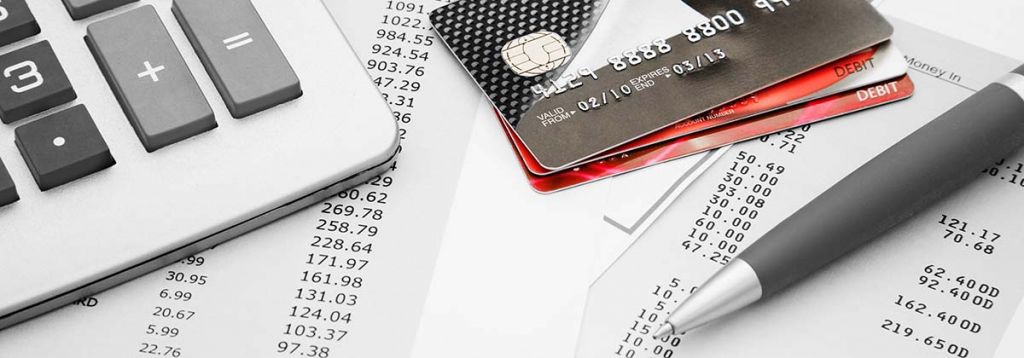Co-author: Olivia Fairhurst
Benjamin Franklin once said that nothing could be certain in this world except death and taxes. To that list, however, you could also add household bills. And, for whatever reason, household bills seem to come in clumps. There may be nothing for a few weeks then, suddenly, it’s the rates, health insurance and car registration all in one hit. All of this can catch you off guard if you aren’t on top of managing your money. Credit cards can be a great tool in mastering the art of how to pay bills, as long as you keep up with repayments – and aren’t paying unnecessarily high interest and fees! Plus, you’ll build up a credit report that is very useful for any future personal loans.
Compare low interest rate credit cards
Five steps on how to stay on top of bills with money management

Step One – Look at your overall costs
It’s difficult to afford something if you don’t know how much it’s going to cost. So, download all your bank statements for the past year and work out what your regular household bills are costing you – things such as rates, utilities, insurances, telephone and car registration. As you start managing your money, you might get a shock at the totals, but don’t panic! As long as you make a plan you can start getting on top of those bills.
Step Two – How to pay bills with a dedicated bank account
If you’re paying your bills through a number of different accounts (or cards), it’s difficult to keep track of money management in terms of what has been paid and when. So, set up a separate bank account that is used only for household bills. Another tip on how to pay bills with a dedicated bank account is to divide payments according to your pay cycle. Divide the total annual cost of your bills (as worked out in Step One) by your pay cycle (e.g. 28 fortnights or 12 months) and each time you get paid, transfer that amount into your dedicated account.
Compare low interest rate credit cards
Step Three – How to pay bills first – and treat yourself later

Sometimes, the amount of money in your dedicated bank account won’t be enough to cover the bills due that month, no matter how good you are at money management. So, as soon as your salary hits your bank account, cover your outstanding bills before you spend money on anything else. Look at it this way: you’re better off not going out for dinner with friends, or not surfing online shopping websites than playing a dangerous game with unpaid car registration or home insurance.
Step Four – Managing your money by changing the billing cycle
How to pay bills effectively will sometimes be swayed by previous purchases or life changes. For example, your home and contents insurance might be a product of when you moved into your current accommodation. The result is that some weeks you can end up flat broke, leaving you to figure out how money management will get you out of the pickle. If it’s an issue for you, change the billing cycle. Phone the financial institution and ask what your payment options are. Provided it’s not going to cost you more (some organisations do charge a premium for more frequent payment) change the payment terms to suit your needs.
Step Five – Money Management and managing bill payments
One of the many benefits of online banking is that you can use internet banking apps to pay bills as often and as early as you like. Once you’ve sorted out steps one to four, you’ll have your finances pretty much under control, so step five simply is about smoothing the process. Most businesses won’t complain if you want to pay your bills in advance, so think about setting up regular direct debits for the big expenses. Twenty dollars a fortnight in advance onto your water or rates notice, for example, means a much smaller bill at the end of the quarter. This is similarly the case with all your insurances and utilities.
Cost of living can cause household stress. Sometimes that stress is mainly because we don’t really know what our living costs are. If you take your time and follow the five steps above, you’ll have a much better handle on your household costs.
| Get organised | Sort through your current files and rip up or shred all the documents you no longer need. Keep anything that you may need in relation to future or past tax returns. Organise and label your folders into categories like Tax, Investments, and Superannuation so they are easy to find and file in the future. |
|---|---|
| Go paperless | Email statements save you a lot of time and space. So check with your bank, utility, mobile and internet providers to see if you can opt for the paperless billing option.They may also offer you the option of paying by direct debit which can save you the stress of having to remember when to pay the bill. |
| Simplify your accounts | If you have multiple bank accounts and you don’t use them all then use this time to simplify your accounts. Close down any that you no longer use and think about giving them a meaningful name so you know exactly what they are for. |
Extra money management tips:
- If you’re in debt, compile all of your debt onto on low-interest credit card.
- Make a budget and stick to it.
- Make sure you’re in a high-interest savings account.
- Be realistic and put money aside for emergencies.
Compare savings accounts with Canstar
All in all, it may seem like a lot of work is required for money management but in the long run you are saving a lot of time and stress. A direct debit, for example, saves you having to go on your banking app each week to make that payment. So, our advice to you is the sooner you put the effort in to get sorted, the better!
Enjoy reading this article?
Sign up to receive more news like this straight to your inbox.
By subscribing you agree to the Canstar Privacy Policy




Share this article